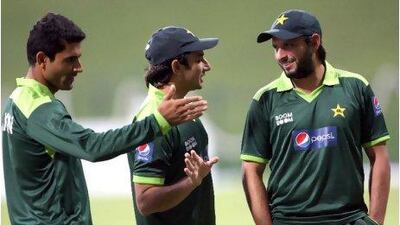Giles Clarke's mission statement for saving Pakistan cricket was written barely three months ago, yet it is already outdated.
"International cricket's economics work entirely on reciprocation: no visits, no income," wrote Clarke, the English cricket executive who heads the Pakistan Task Team of the International Cricket Council (ICC).
"No visitors, no chance to watch national heroes. No money for development, no funds to build stadiums, no media coverage. No tours, no chance to pit themselves against the best and improve."
Clarke went on to detail the ways in which the international cricket community could help Pakistan - such as offering their home grounds to let Pakistan host matches and generate income.
He was a driving force behind the England and Wales Cricket Board providing their grounds as a summer home for Pakistan. The nomadic side thus played a nominal home series against Australia, and then an away one against England - all in the same country.
But within days of Clarke's report being published in the Wisden Cricketer magazine, the spot-fixing scandal erupted during the Pakistan-England series at Lord's, and the whole atmosphere of conviviality was torpedoed.
Clarke was seething, and his contempt for the alleged perpetrators was thinly disguised at the end of the series. Shortly after, news emerged that Pakistan would not be invited back.
Now, with their own country also off limits because of security concerns, Pakistan's cricketers would be all but homeless were it not for the UAE.
Homeless and penniless.
Pakistan cricket has been financially crippled, in part because of being unable to play matches at home and in part because of the consequences of the Mumbai attacks of 2008. Severed diplomatic ties between India and Pakistan meant the indefinite cessation of the most watched and most lucrative series in cricket.
The series was said to be a cornerstone of the US$140 million (Dh514m) five-year deal between the Pakistan Cricket Board (PCB) and Ten Sports, the Dubai-based broadcaster which holds exclusive rights to Pakistan's home matches until 2013.
At the end of last year, the PCB claimed losses of up to $125m, 71 per cent of their total projected revenue, due to a series of tours being postponed, relocated or cancelled.
Included in this were the costs of losing the staging rights to the 2008 Champions Trophy and their share of next year's World Cup in the subcontinent.
Uppermost in the deficit, however, were the cancelled matches against India. Ijaz Butt, the PCB chairman, said the home series against India last year, which was cancelled in the wake of the Mumbai attack, cost the PCB about $40m.
Hosting home series outside of their homeland is a logistical and financial challenge. As the host board, the PCB takes on all the staging costs, such as the hotel fees for putting up both sets of players and officials, as well as all the match-day costs.
Hotel prices are generally far higher in the UAE than in Pakistan, yet the board can offset that expense because ticket revenue is greater here.
The UAE has also agreed to stage the limited-overs leg of Pakistan's "home" series against Sri Lanka next year. That tour will mark the first time the PCB has hosted the Sri Lankans since the ambush on the Sri Lanka team bus in Lahore last March.
Whether the Test series is to be played here, too, is likely to be determined in the coming weeks.
The two-Test series between South Africa and Pakistan next month is effectively a test case for Test cricket. Attendances for cricket's longest format have dwindled in recent years, with England being the only nation where Test matches attract significant numbers of spectators.
Whatever the format, Pakistan cricket has a long-standing association with the UAE that was formed well before the current problems surfaced. Ask any Pakistan player what he thinks of playing here, and the answer is usually gushing.
"It is like our second home," Younus Khan was fond of saying when he captained the national team here last year.
For some of the players, it is now their first home. Shoaib Malik, the absent former captain, has a residence on Palm Jumeirah with his wife, the Indian tennis player, Sania Mirza.
And Waqar Younis, the fast-bowling-great-turned-coach, went to school in Sharjah.
A simple study of their win-loss record supports the idea that Pakistan are happy to regard the Emirates as home. They have a win rate of almost 65 per cent in their one-day international (ODI) matches on UAE soil, stretching back to the first matches played in Sharjah in 1984.
Against their greatest rivals, India, this soars to more than 73 per cent, which is well up on their overall win rate of 53 per cent in all the ODIs they have played.
So given the choice, if Pakistan had to play anywhere but their homeland, they would play here.
However, the Emirates do not have an exclusive claim to them. Singapore has also signalled its willingness to take in international cricket's wanderers in recent times, as it gears up to rival the UAE as a hub for neutral destination cricket.
The PCB had initial discussions over playing their home series with Australia in Singapore, and the country's cricket administrators believe they will be ready to stage matches from March 2011.
"The situation with Pakistan is unfortunate but we have every confidence that the ICC and the PCB will do the necessary to rid the game of any stigma that may have arisen [from the spot-fixing scandal]," said a spokesman for the Singapore Cricket Association.
"We are looking forward for this and working towards achieving a neutral venue status be it for Pakistan or any other teams.
"We are very confident that the teams from the subcontinent - India, Sri Lanka, Pakistan and Bangladesh - are looking forward for a change in venues."


